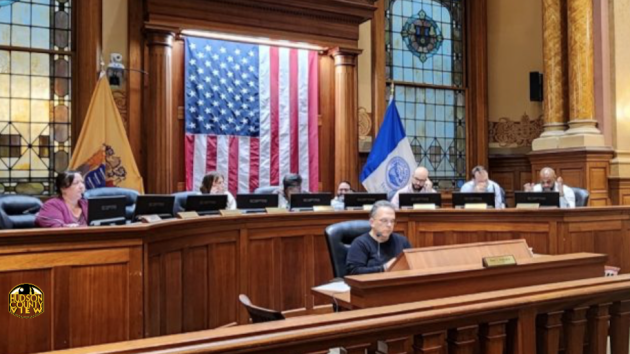The Jersey City Council discussed a resolution that would grant a three-year, $4,276,001 contract for crisis interventionists for 911 behavioral health call services during their caucus meeting yesterday.
By Daniel Ulloa/Hudson County View
Health and Human Services Director Stacey Flanagan explained that the Jersey City Medical Center (JCMC) responded to the request for proposal (RFP) “to allocate mental health providers to provide community crisis response to 911 behavioral health call services,” the resolution says.
The issue has become a key political talking point heated after Andrew Washington, a man with a long history of mental illness, was fatally shot by a Jersey City police officer while wielding a knife during an episode in August.
Flanagan invited JCMC Vice President of Operations Rob Winston to speak to the council to explain the program.
“How do they engage with the community?” Councilman-at-Large Daniel Rivera asked.
Winston said they will embed a mental health clinician within the 911 call center. If a call is determined to be related to mental health, it would be directed to their emergency medical dispatch team.
Then a mobile EMT and mental health professional team would be dispatched to the scene.
“If it’s determined to be a mental health crisis that can be de-escalated in the community … there’s going to be warm handoffs up to and including bringing people to services,” Winston added.
“What’s the difference between what you just said to what’s been going on?” Rivera asked.
Winston said they want to bring EMTs to address the issue.
“What are the options that the team or the individual have?” Ward F Councilman Frank “Educational” Gilmore asked.
“They would go out there, do a complete assessment: If it is truly a mental health situation, could the person be de-escalated?” Winston noted, adding that depending on the situation, the goal may be to get someone to the JCMC safely.
“What determines if a person is in a phase where they need medical intervention versus where they need mental health intervention? Is there a handbook?” Gilmore questioned.
“A handbook is tough. A lot of this is based on clinical discretion and based on completing a clinical assessment,” Winston replied.
Gilmore was curious how the hours of operation were determined.
Flanagan said the council only allocated $1.2 million annually for the program, which limits the hours they can spend on mental health professionals. She also mentioned that they put out an RFP three times.
“I’m already at the max of a budget at $1.2 million. Things cost a lot more than we anticipated,” she explained.
The contract calls for $1,271,79 in the first year, $1,309,952 in the second year, and $1,349,251 in year three, along with a $345,000 startup fee.
“We could expand it an additional 20 percent before going out to bid again. We could also work with the vendor that’s selected to change hours,” Business Administrator John Metro added.
“We do have the ability to allocate more resources. What specific services does the BERT (Behavioral Emergency Response Team) program intend to offer?” asked Ward E Councilman James Solomon.
Winston said they can help facilitate mental health services in non-crisis situations.
“Is there any sort of check-in?” Solomon asked, to which Winston said they check in after 30 days.
“How are JCPD and the team working?” Solomon continued.
“It would be a dialogue with JCPD and their leadership. We are together coming up with a best-case scenario,” Winston replied.
“Would there be a scenario in which … a member of the BERT team and an officer working together?” Solomon further questioned.
“It’s hard for me to answer that without JCPD being present,” Winston replied.
Furthermore, Winston later said that the BERT team would be the initial responder and the mental health crisis has a separate hotline to be contacted on.
“The mental health clinician with the dispatch center, are they 24/7? Is there a time limit?” Ward D Councilman Yousef Saleh asked.
“The intention was the hours of operation of this program,” Winston replied, indicating they are supposed to be available from 2 p.m. until 10 p.m.
“[Public Safety] Director [James] Shea has said there was a certain amount of calls for mental services. Do we have data on the time period?” Saleh asked.
Flanagan said they used data to formulate the RFP to make the most of the budget.
“Is there a time limit for the mental health professional that’s on scene?” Saleh asked.
“Time will not be a factor,” Winston responded.
“Is this modeled on any best practice around the country?” Saleh followed up.
“The model we settled on… was a model coming out of Austin, Texas,” Winston answered.
Councilwoman-at-Large Amy DeGise asked how this compared to training for their current 911 dispatchers, to which he said it would be similar and that they have a training scheduled with the City of Austin.
“Are our current 911 dispatchers able to reach out during their working hours? Could you do a follow-up?” DeGise asked.
“Yes,” Winston replied.
“They’ll be training for that, too?” DeGise asked.
Winston said the mental health dispatcher often sends an ambulance to take them to the hospital.
“What is the success rate of that model? I have some very serious concerns about the telephonic part,” Ward B Councilwoman Mira Prinz-Arey inquired, noting that they could hang up or dispatchers might not understand the person.
“It is a parallel. It is not an equivalent model. There are scenarios for all of that. Certainly, the individual in crisis might not communicate well,” Winston noted.
“At any point, do you call the police department? You’re mapping it up like this is all ABC,” Council President Joyce Watterman said.
Winston said they could call for police backup or to take someone against their will once a mental health screener approves it.
“Daniel Rivera is going through a crisis. Daniel Rivera’s family is right next to Daniel Rivera. They call who? What happens?” Rivera asked.
“The mobile responders are going to be dispatched,” Winston replied, adding that their dispatch center is in New Brunswick.
“I just seen so many instances where implicit bias has played a role in decision making. There has to be at least this amount of intervention before it’s escalated to police called in. I just don’t feel comfortable,” Gilmore interjected.
“We need something more concrete. We have a huge mental health issue in Jersey City: I’m not pleased with how medical center handles instances now.”
Gilmore said he heard of an incident where the JCMC kicked a man off the premises who needed help.
“Can’t we create a board?” Watterman asked, to which Flanagan replied they could create a review committee.
“If we can dedicate more money, then we can get more services,” Flanagan declared.
“Money’s not the problem. We’re just trying to get it right now,” Watterman responded.
Metro reiterated they could increase the budget by 20 percent and work with the vendor on adjusting the hours.
“Is there a possibility for us to have this advisory committee with community input?” Gilmore asked.
Flanagan said she spoke to Jersey City Together, who has been pushing for the program for the past few years, to commit to a $1.2 million annual fee.
She also noted several times the RFP did not get good responses due to the small budget.
“I’m very open to community input. It’s going to take two meetings and 20 days,” Flanagan added.
DeGise also suggested that some of the funding should come from the Department of Public Safety, though Shea had left at that point.
“How on Earth was Shea allowed to leave?” Ann-Marie Nazzaro, of Jersey City Together, exclaimed from the crowd.
“That’s a conversation we’re going to have with them. I know you’re passionate,” Watterman replied.












First of all none of you really know how to assess mental illness. Secondly, there’s all types of levels of mental illness. In if you are not a licensed professional or have some knowledge on how to de escalate a mental health crisis?
Depending on the level of mental health issues of the person, you will definitely need armed security team and the police. You have passive aggressive and aggressive mentally ill or mentally challenged people out here.
In some of them are dealing with the side effects of substance abuse and from weed, heroine and cocaine. A lot of these people are on Psychiatric medication and when they go back to using drugs. The medication is no longer effective.
If you are dealing with a aggressive mentally challenged person and they are ingesting drugs you will definitely need the police. Perhaps, not to shoot a kill the individual. However, you need security and police department. Because, a regular person will not be able to handle these types of people.
Must move with kids gloves 🤔
Respectfully,
Renea M Hayes, As/ HS/ BS/BA/HM/ MBA/ HCA/ Risk / Ed.d (ABD)
They already send EMT’s for mentally disturbed people. And if that disturbed person is carrying a weapon or making threats they have the police take over. What’s going to change her???